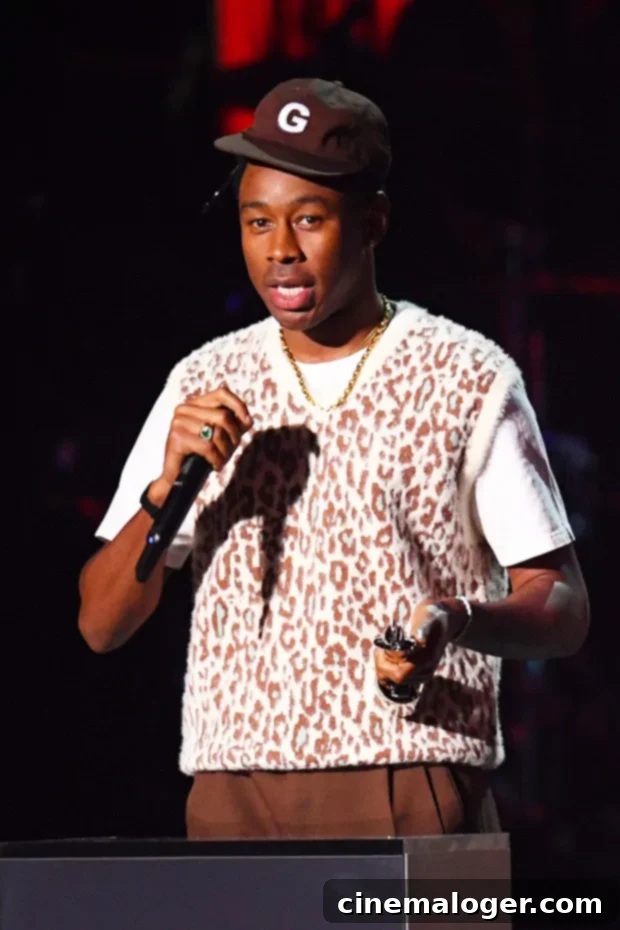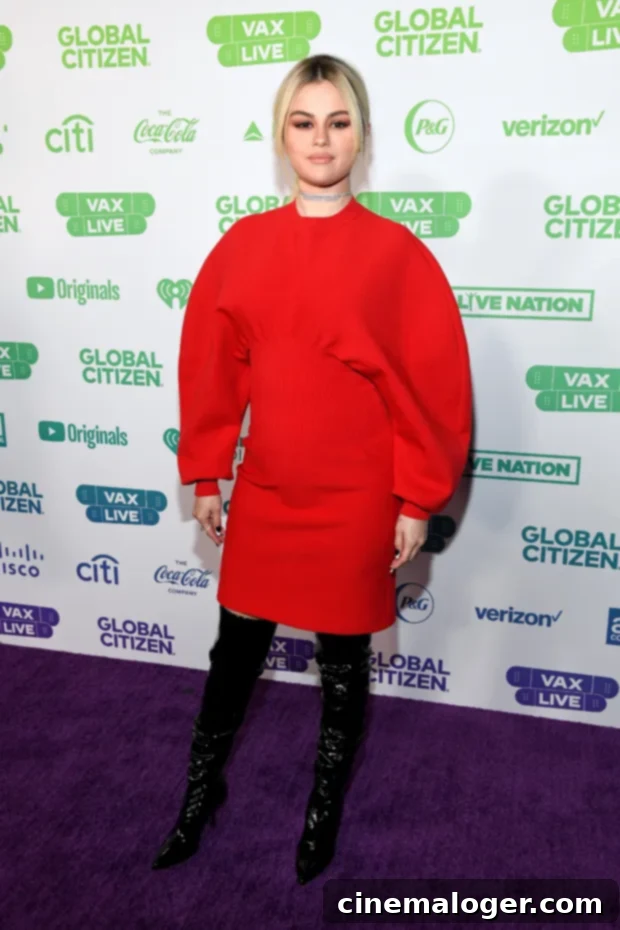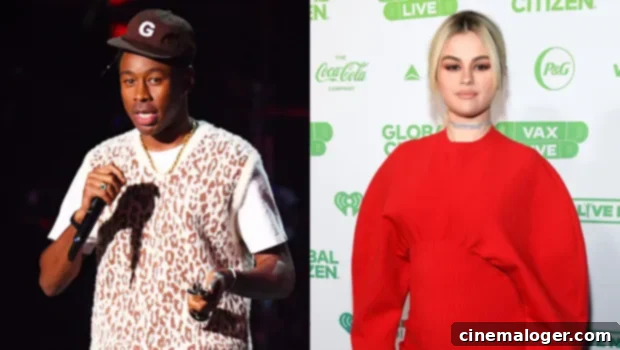Tyler, The Creator’s “Manifesto”: A Deep Dive into His Apology to Selena Gomez and Artistic Evolution
In a significant moment of self-reflection and artistic candor, Grammy-winning artist Tyler, The Creator has used his latest album, Call Me If You Get Lost, to publicly address and apologize for past controversial remarks. Released on June 25, his sixth studio album features the standout track “Manifesto,” where the acclaimed rapper explicitly extends an apology to actress and singer Selena Gomez for a series of “crazy” tweets he posted about her in 2010 and 2011. This heartfelt lyrical admission not only highlights Tyler’s personal growth but also sparks a broader conversation about accountability, celebrity apologies in the digital age, and the evolution of an artist’s public persona.
The track “Manifesto” serves as a confessional, allowing Tyler to reflect on his journey, his past provocations, and the consequences of his earlier, more volatile public image. His candid lyrics confront the “cancel culture” phenomenon, acknowledging that he faced scrutiny and backlash long before the term became a mainstream part of online discourse. He raps, “I was cancelled before cancelled was with Twitter fingers (Haha) / Protestin’ outside my shows, I gave them the middle finger (F**k ’em),” painting a vivid picture of the defiant, boundary-pushing artist he once was. This particular verse sets the stage for a more profound moment of introspection, where he specifically addresses the decade-old tweets directed at Selena Gomez.

The Genesis of a Controversy: Examining Tyler’s Past Tweets
The tweets in question, which date back to when Tyler was a teenager and Selena Gomez had just turned 18, were explicit and highly inappropriate. They insinuated a sexual interest in Gomez, often using crude language, and at one point, even referencing her then-boyfriend, Justin Bieber. Tyler himself now acknowledges the immature nature of these posts in “Manifesto,” stating, “I was a teener, tweetin’ Selena crazy sh*t / Didn’t wanna offend her, apologize when I seen her / Back when I was tryna f**k Bieber, Just-in.” This line serves as a direct and unvarnished admission of his past behavior, highlighting a stark contrast to his current artistic maturity. The reference to “tryna f**k Bieber” is particularly telling, revealing a youthful, provocative attempt to gain attention and perhaps shock value, a common trait in his earlier musical endeavors and public antics.
For many years, these tweets remained a contentious point for fans and critics alike, often resurfacing in discussions about celebrity behavior and the permanence of digital footprints. Tyler’s early career was marked by a deliberate embrace of controversy and an often confrontational style, which garnered him both fervent admiration and considerable criticism. His art often pushed boundaries, both lyrically and visually, making him a divisive figure in the hip-hop landscape. This apology, therefore, is not just a simple retraction but a significant indicator of his evolution as a person and an artist, demonstrating a willingness to acknowledge and atone for the impact of his past actions.
Tyler’s Journey of Self-Discovery and Artistic Growth
Tyler, The Creator’s journey from a provocative internet personality and Odd Future frontman to a critically acclaimed, Grammy-winning artist has been a fascinating trajectory. His later albums, particularly Flower Boy and IGOR, showcased a profound artistic shift, exploring themes of loneliness, identity, and sexuality with a newfound vulnerability and emotional depth. This period also saw him subtly, and later more overtly, discuss his relationships with men, including an apparent confirmation of a relationship with Jaden Smith in November 2018. This personal evolution adds another layer of complexity and sincerity to his apology to Selena Gomez, suggesting a broader process of self-discovery and a re-evaluation of past behaviors, particularly those that may have been rooted in a different understanding of himself or the world.
The maturity evident in his recent works, both musically and thematically, stands in stark contrast to the aggressive, often shocking persona of his earlier years. His ability to craft intricate narratives and explore complex emotions has earned him widespread critical acclaim and a dedicated fanbase that appreciates his continuous artistic metamorphosis. This growth makes the apology in “Manifesto” even more impactful. It’s not just a PR move; it feels like a genuine moment of reckoning from an artist who is increasingly comfortable with who he is and willing to confront his past transgressions head-on. The transformation from a “teener, tweetin’ Selena crazy sh*t” to an artist capable of such profound self-reflection speaks volumes about his personal and professional journey.

Selena Gomez’s Perspective and the Impact of Public Apologies
While Tyler’s lyrics in “Manifesto” seemingly allude to an in-person apology (“apologize when I seen her”), Selena Gomez has yet to publicly address the lyrics or acknowledge Tyler’s apology. This silence, while understandable, leaves an open question about the ultimate impact of such public acts of contrition. For Selena, who has navigated the intense scrutiny of fame since a young age and has often used her platform to advocate for mental health and body positivity, being the subject of crude, unsolicited sexual remarks from another public figure would undoubtedly have been challenging. Her career, marked by resilience and a focus on authenticity, has seen her evolve from a Disney star to a global pop icon and an influential advocate.
The significance of a public apology, particularly from a prominent artist like Tyler, The Creator, extends beyond the individuals involved. It contributes to a broader cultural dialogue about accountability and respect in public discourse. In an era where past digital missteps can haunt individuals indefinitely, an artist’s willingness to confront and express remorse for previous actions can be seen as a powerful step towards personal responsibility. It also highlights the responsibility that comes with having a platform, especially when addressing younger audiences who might be influenced by celebrity behavior. Whether or not Selena chooses to respond, the apology itself serves as a public acknowledgment of harm caused and a demonstration of personal growth from Tyler’s side.
“Manifesto” and the Thematic Fabric of “Call Me If You Get Lost”
“Manifesto” is more than just an apology; it’s a track steeped in self-examination and artistic declaration, fitting perfectly within the overarching narrative of Call Me If You Get Lost. The album itself is a rich tapestry of Tyler’s influences, delivered through the persona of “Tyler Baudelaire,” a globetrotting, sophisticated character who navigates themes of love, loss, ambition, and self-discovery. The album’s production, meticulously crafted by Tyler himself, showcases his distinctive sonic palette, blending lush instrumentation with sharp, incisive lyricism. “Manifesto” stands out as a pivotal moment, offering a raw, unvarnished look into the artist’s conscience amidst the album’s otherwise opulent and adventurous soundscapes.
Beyond the Selena Gomez apology, “Manifesto” delves into Tyler’s broader reflections on his career, his struggles with public perception, and his artistic integrity. It’s a track that embodies the album’s spirit of candid self-expression and its exploration of identity. The album features a star-studded lineup of collaborators, including hip-hop legends and contemporary talents such as Lil Wayne, Pharrell Williams, Ty Dolla Sign, and others. Each collaboration adds a distinct flavor, yet the core of the album remains Tyler’s unique vision and storytelling prowess. “Manifesto,” with its deeply personal revelations, anchors the album in a sense of genuine human experience, grounding the larger-than-life persona of Tyler Baudelaire with relatable themes of regret and redemption.
The album, following the immense critical and commercial success of IGOR, demonstrates Tyler’s continued evolution as a musical force. Call Me If You Get Lost has been praised for its mature sound, intricate production, and lyrical depth, further solidifying Tyler’s status as one of the most innovative and influential artists of his generation. The inclusion of such a personal and public apology within this highly anticipated work underscores the album’s commitment to authenticity and Tyler’s willingness to use his art as a vehicle for growth, making it a compelling listen for both long-time fans and new audiences alike.
Conclusion: An Artist’s Evolution in the Public Eye
Tyler, The Creator’s apology to Selena Gomez in “Manifesto” from Call Me If You Get Lost represents a significant moment in his illustrious career. It’s a testament to his artistic and personal evolution, demonstrating a profound capacity for self-reflection and accountability. In an age where celebrity missteps are often met with swift and unforgiving judgment, Tyler’s decision to confront his past head-on, through his art, offers a compelling example of growth.
This gesture not only provides closure for an old controversy but also reinforces Tyler’s image as an artist who is continuously evolving, pushing boundaries not just musically, but also personally. While Selena Gomez’s response remains private, the apology itself contributes to an important conversation about public figures, their past actions, and the journey of maturation in the unforgiving glare of the spotlight. “Manifesto” is more than just a song; it’s a powerful statement of intent, signaling a new chapter for an artist who continues to redefine what it means to be a contemporary icon.
